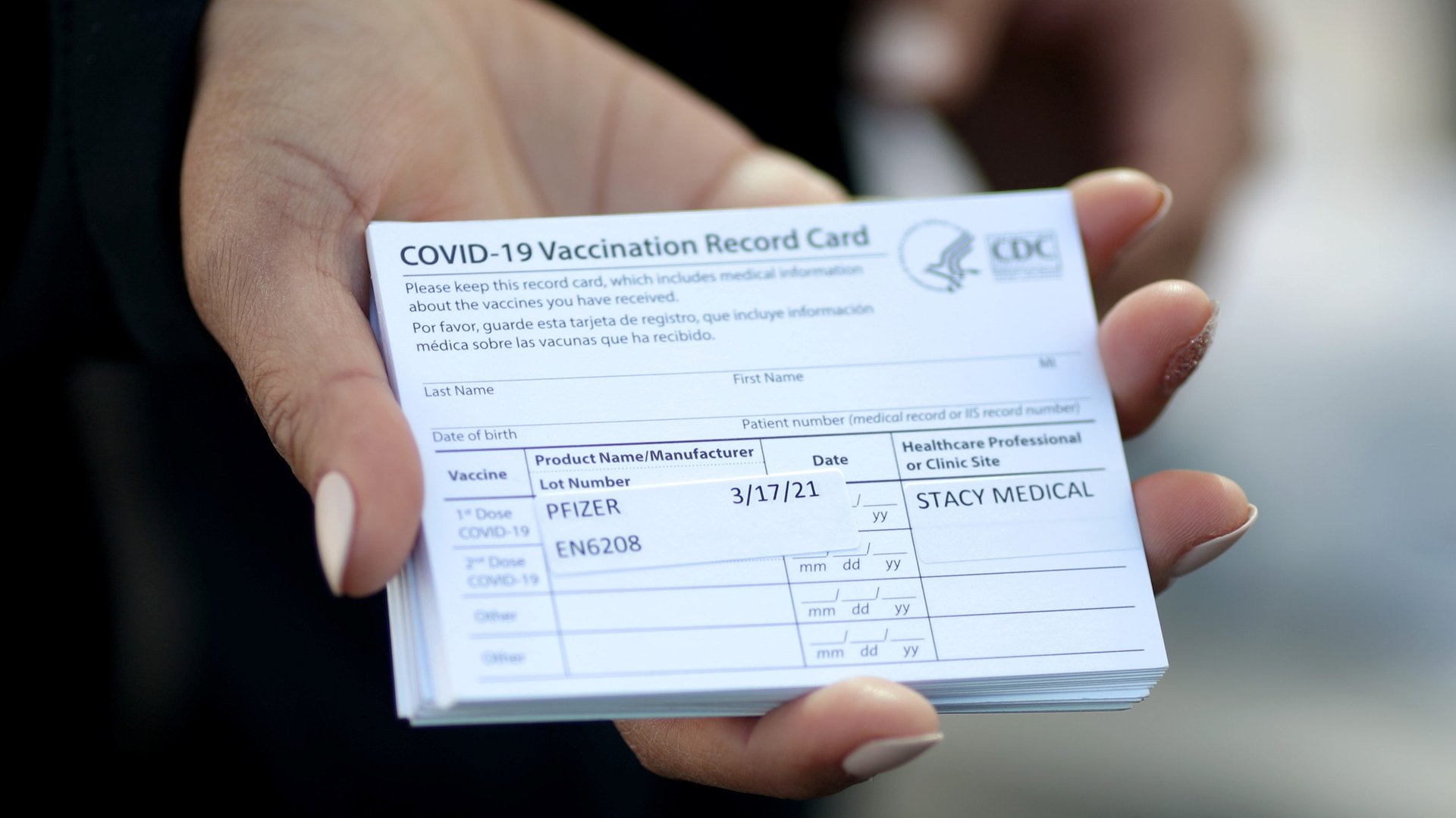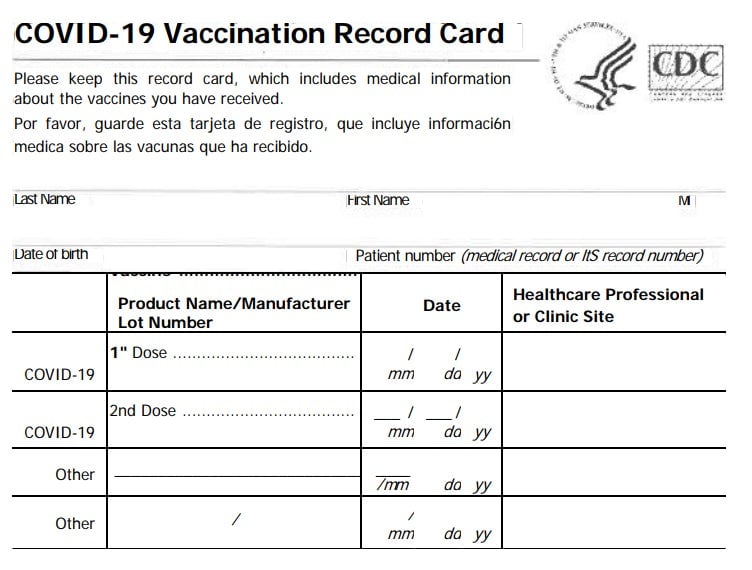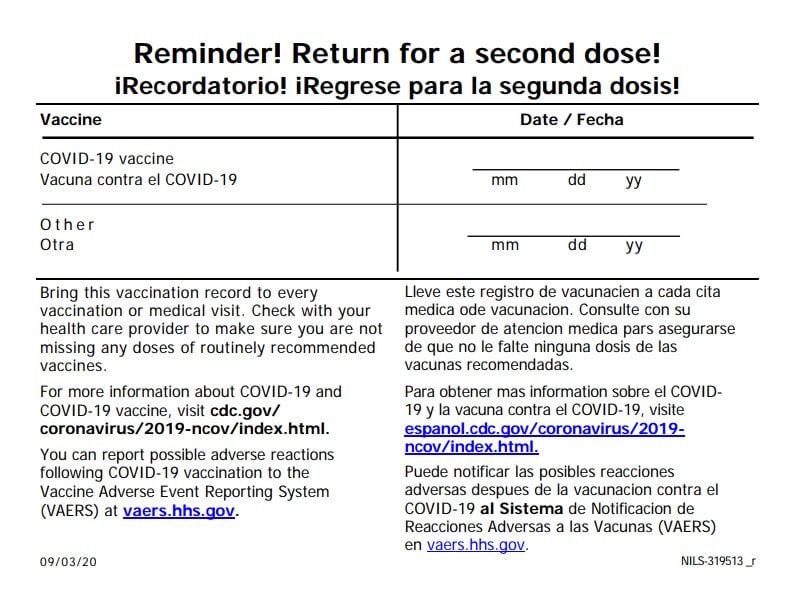How and why to protect your vaccine card
So you’ve gone and done it—you got your Covid-19 vaccine.


So you’ve gone and done it—you got your Covid-19 vaccine.
In the US, where the vaccination campaign is proceeding at the speedy pace of 3 million doses a day, the growing number of lucky shot recipients are sent home with arguably the hottest status symbol around: a card proving you belong to the Covid-19 vaccinated club.
Everyone who gets a vaccine also receives a standardized card from the Centers for Disease Control and Prevention (CDC). On it are written the patient’s name, their medical record number, and the information about the vaccine they were administered.


This card is required to get the second dose of the vaccine, for those who need it, and acts as proof that the patient has been immunized against Covid-19. While it’s not necessarily an official document—not yet at least—and it’s not clear whether or where it will be required (for instance, to travel), the CDC recommends keeping the card and bringing it to all future medical appointments.
Should I laminate my Covid-19 vaccine card?
Be it as the totemic reminder that humanity came together and came up with a vaccine for Covid-19 in under a year, or just as a potential way to unlock your next trip abroad, the instinct to make the card more resistant to accidental damage is fully understandable. It’s just a piece of non-coated paper, after all, which is why in many locations it’s actually handed out in a waterproof ziploc bag.
That isn’t very glamorous though, is it?
One way people have been adding some gravitas to their humble Covid-19 card is by laminating it. The office supply chain Staples has offered to laminate the card for free, which adds to the appeal. But while a laminated card looks far more proper than a paper card inside a ziploc bag, you might want to hold off on your vaccine card improvement.
First of all, you should resist the urge of laminating the card after the first dose of a vaccine that needs two, as it would make it hard to note down the information of your second shot. But even after the course is complete, we don’t yet know whether there will be a need for booster shots next year and if they will have to be added on the card.
Covid-19 vaccine cardholders—they are a thing
Lucky for you, not laminating your card doesn’t mean you are stuck with ziploc normcore. The internet already has a lot of solutions to show your card the respect it deserves. You can go for a sleek plastic protector that’s just the right size, or get a card sleeve and wear it around your neck with a lanyard (though there is no need to). You can even splurge on a customized holder covered in fabric, which offers the potential for mask-matching.
Then there is the option of buying a replacement card that has the details of your vaccine card, so you can keep the original at home. That is, if you don’t mind spending $19 for the non-official copy of the official card you got for free.
Should I take a photo of my Covid-19 vaccine card?
The CDC encourages patients to take a photograph of their vaccination card, and keep it for their records. Saving it on your phone, backing it up, mailing it to yourself—these are all good options to make sure that, should you misplace your card, you can find the patient number and all your vaccine information.
But sharing your card on social media is not such a good idea. The US Federal Trade Commission warns that can lead to identity theft—after all, it has your name and date of birth on it, as well as other information such as your vaccine location that could be used to find other sensitive data.
“Think of it this way—identity theft works like a puzzle, made up of pieces of personal information. You don’t want to give identity thieves the pieces they need to finish the picture,” reads the commission’s site.
Additionally, there is a concern that scammers might start selling fake vaccination cards—which has happened in the UK already.
What should I do if I lose my Covid-19 vaccine card?
Lamination, fancy cases, photographs—all of these are great precautions, but accidents happen. You might lose your card.
Would you have to take the shot again? No, you would not. There is a way to get a replacement, or at least locate your medical record number and therefore the vaccine information, though it’s just enough of a hassle to dissuade you from being too cavalier with your precious card.
If you lost it or weren’t given one for some reason, first try and contact the site where you got your vaccine, and follow their instructions about getting a card or replacing it. If you’re not able to speak directly with the vaccination site, you can contact your state’s Immunization Information System (IIS)—they should be able to locate your records for you.
Should that not work either, the CDC recommends that those who still need a second dose reach out to a vaccine provider to assess their options.
To avoid this scenario, the CDC also recommends enrolling in digital follow-up services such as VaxText and v-safe, so your information will be saved in their database.